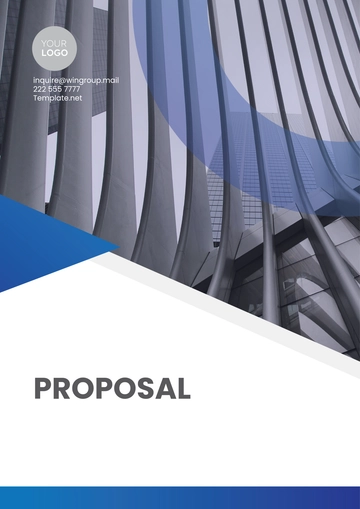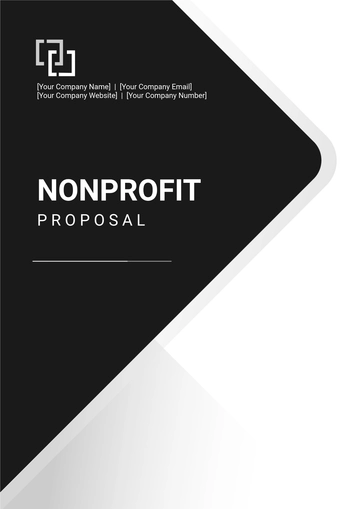Free Sustainability Project Proposal

Introduction
The [Your Company Name] in San Verde aims to tackle both energy poverty and climate change by installing solar panels on 100 low-income homes. This project will significantly reduce carbon emissions while cutting utility costs for families living below the poverty line. San Verde has been identified as an area with high energy costs, and this project directly addresses that issue, aligning with the United Nations Sustainable Development Goal (SDG) 7: Affordable and Clean Energy. By integrating renewable energy solutions, we aim to create a long-lasting impact on both the local economy and the environment.
Project Objectives
Reduce the carbon footprint in San Verde by 150 metric tons of CO2 annually through the installation of solar panels.
Lower energy bills by an average of 30% for 100 low-income families, enabling them to redirect savings toward essential needs like healthcare and education.
Promote renewable energy adoption in the community, creating 20 temporary jobs during the installation phase and offering technical training for future employment in the green energy sector.
Scope of Work
Project Activities:
Phase 1: Feasibility Study and Community Engagement
Conduct energy audits for 100 households in San Verde to assess their energy consumption and suitability for solar installation.
Host five community meetings to explain the benefits of solar energy and to obtain community feedback.
Phase 2: Procurement and Installation
Partner with local solar providers, such as Solar Verde Inc., to procure and install 350W solar panels on 100 homes.
Create 20 temporary jobs for local residents during installation, with five residents trained in solar panel maintenance and repair.
Phase 3: Monitoring and Maintenance
Establish a remote energy monitoring system for tracking solar panel performance and energy savings.
Offer a 3-year maintenance package ensuring optimal performance of the installed panels, with yearly system inspections.
Target Audience/Community:
The primary beneficiaries of this project are 100 low-income households in San Verde, where the median household income is below $25,000 annually. Many of these families spend over 15% of their income on energy costs. The project will also involve local contractors and create training opportunities to empower community members with green energy skills.
Sustainability Impact
Environmental Impact:
The solar panels installed on 100 homes will generate 350,000 kWh of clean energy annually, reducing CO2 emissions by 150 metric tons per year. This is equivalent to taking 40 gas-powered cars off the road or planting 2,500 trees.
The project reduces reliance on fossil fuels, contributing to the local government’s target of achieving net-zero carbon emissions by 2060.
Social Impact:
The project will reduce energy bills for participating households by an average of $500 per year, allowing families to reallocate funds toward essentials like healthcare, education, and food security.
Five community workshops will educate residents about renewable energy, empowering them to take control of their energy consumption and understand the long-term benefits of solar power.
Economic Impact:
The project will inject $200,000 into the local economy by employing local contractors and training residents in solar panel installation and maintenance.
The long-term financial benefits include lower government subsidies for energy costs and the creation of 20 green jobs during the installation phase, as well as five ongoing maintenance positions.
Project Timeline
Phase | Start Date | End Date | Key Milestones |
|---|---|---|---|
Feasibility Study & Planning | Jan 2050 | Mar 2050 | Energy audits completed; 100 homes selected |
Community Engagement & Training | Mar 2050 | Apr 2050 | 5 workshops conducted; 5 residents trained |
Installation | May 2050 | Sep 2050 | 100 homes with solar panels installed |
Monitoring & Review | Oct 2050 | Oct 2053 | Annual reviews of energy savings |
Budget
Item/Resource | Cost | Description |
|---|---|---|
Personnel | $75,000 | Salaries for project management and labor |
Equipment/Materials | $350,000 | Purchase of 350W solar panels and installation tools |
Training and Workshops | $20,000 | Community training programs and materials |
Travel/Logistics | $15,000 | Transportation for installation teams |
Maintenance (3 years) | $25,000 | 3-year maintenance contract for installed panels |
Miscellaneous | $10,000 | Unforeseen project-related costs |
Total Budget | $495,000 | Estimated total cost for the project |
Monitoring and Evaluation
Key Performance Indicators (KPIs):
150 metric tons of CO2 reduced annually.
Generation of 350,000 kWh of renewable energy per year, enough to power 50 homes.
30% reduction in energy bills for participating households.
5 residents trained in solar maintenance and repair.
Monitoring Methodology:
Solar panel performance will be monitored in real-time using remote sensors connected to a cloud-based system. This data will be reviewed monthly to ensure efficiency.
Energy savings will be tracked by comparing pre-installation and post-installation utility bills to measure financial impacts on households.
Annual reviews will be conducted with community stakeholders to assess the long-term success and community satisfaction with the project.
Risk Management
Supply Chain Delays:
Mitigation: Secure agreements with three solar suppliers to ensure alternative sourcing if delays occur.
Community Resistance:
Mitigation: Hold regular community meetings to explain the project’s benefits, answer questions, and address concerns. A community liaison will be hired to facilitate communication.
Weather-Related Delays:
Mitigation: Build a buffer into the project timeline to accommodate unexpected weather conditions. Work will be scheduled during the dry season to avoid significant delays.
Conclusion
The [Your Company Name] in San Verde is a transformative project that addresses climate change and energy poverty through renewable energy solutions. By installing solar panels on 100 homes, we will not only reduce the community's carbon footprint but also provide much-needed financial relief for low-income families. The long-term benefits, including job creation, community education, and substantial environmental impact, align perfectly with San Verde’s sustainability goals and the broader global push toward renewable energy.
Contact Information
Project Lead:
Name: [Your Name]
Title: Project Manager, [Your Company Name]
Email: [Your Company Email]
Phone: [Your Company Number]
Project Team:
John Smith, Solar Installation Lead
Mary Lee, Community Engagement Specialist
Paul Thompson, Financial Analyst
- 100% Customizable, free editor
- Access 1 Million+ Templates, photo’s & graphics
- Download or share as a template
- Click and replace photos, graphics, text, backgrounds
- Resize, crop, AI write & more
- Access advanced editor
Present your green initiatives with this customizable and editable Sustainability Project Proposal Template from Template.net. Showcase your project’s environmental impact, goals, and resources. Fully editable in our AI Editor Tool, ensuring a professional and comprehensive sustainability proposal.
You may also like
- Business Proposal
- Research Proposal
- Proposal Request
- Project Proposal
- Grant Proposal
- Photography Proposal
- Job Proposal
- Budget Proposal
- Marketing Proposal
- Branding Proposal
- Advertising Proposal
- Sales Proposal
- Startup Proposal
- Event Proposal
- Creative Proposal
- Restaurant Proposal
- Blank Proposal
- One Page Proposal
- Proposal Report
- IT Proposal
- Non Profit Proposal
- Training Proposal
- Construction Proposal
- School Proposal
- Cleaning Proposal
- Contract Proposal
- HR Proposal
- Travel Agency Proposal
- Small Business Proposal
- Investment Proposal
- Bid Proposal
- Retail Business Proposal
- Sponsorship Proposal
- Academic Proposal
- Partnership Proposal
- Work Proposal
- Agency Proposal
- University Proposal
- Accounting Proposal
- Real Estate Proposal
- Hotel Proposal
- Product Proposal
- Advertising Agency Proposal
- Development Proposal
- Loan Proposal
- Website Proposal
- Nursing Home Proposal
- Financial Proposal
- Salon Proposal
- Freelancer Proposal
- Funding Proposal
- Work from Home Proposal
- Company Proposal
- Consulting Proposal
- Educational Proposal
- Construction Bid Proposal
- Interior Design Proposal
- New Product Proposal
- Sports Proposal
- Corporate Proposal
- Food Proposal
- Property Proposal
- Maintenance Proposal
- Purchase Proposal
- Rental Proposal
- Recruitment Proposal
- Social Media Proposal
- Travel Proposal
- Trip Proposal
- Software Proposal
- Conference Proposal
- Graphic Design Proposal
- Law Firm Proposal
- Medical Proposal
- Music Proposal
- Pricing Proposal
- SEO Proposal
- Strategy Proposal
- Technical Proposal
- Coaching Proposal
- Ecommerce Proposal
- Fundraising Proposal
- Landscaping Proposal
- Charity Proposal
- Contractor Proposal
- Exhibition Proposal
- Art Proposal
- Mobile Proposal
- Equipment Proposal
- Student Proposal
- Engineering Proposal
- Business Proposal





























